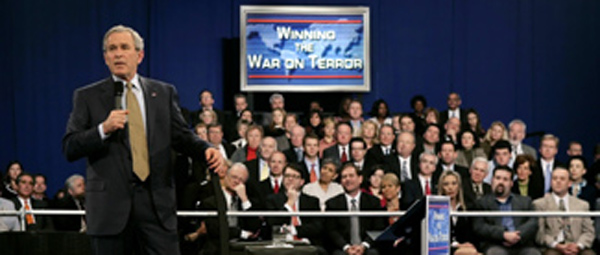| Home | Blog | Ask This | Showcase | Commentary | Comments | About Us | Contributors | Contact Us |

Shouldn't we drop the name 'War on Terror?'COMMENTARY | April 113, 2007Bush's favorite phrase has created a culture of fear -- but beyond that has no useful function. And while we're at it, what's the right way to describe what the U.S. is doing in Iraq? By Dan Froomkin Back in November, when NBC announced that it would start calling the conflict in Iraq what it is -- a civil war – the White House howled in protest and the Washington establishment belittled it as a semantic sideshow. But I think it made a difference. Watching a major media institution assert its right to its own word choice (rather than letting the White House set the terms of the debate) emboldened the rest of the press corps. It ushered in a period of greater truth-telling. And after a while, even the White House was forced to admit that Iraq was indeed in a state of civil war – among other things. (President Bush still maintains that Iraq's civil strife only dates back to the attack on the Golden Mosque of Samarra in February 2006 – an account which, as McClatchy’s Mark Seibel has explained, “understates by at least 15 months when Shiite death squads began targeting Sunni politicians and clerics.” But you can’t have everything.) Now a greater challenge is upon us. Is it time for the media establishment to stop using Bush’s favorite phrase: the "Global War on Terror?" And while we’re at it, what is the right way to describe what the U.S. is doing in Iraq? Ever since Bush started using the phrase "Global War on Terror", there’s been some pushback. After all, it’s not a war in anything like the traditional sense. You can’t declare war against a tactic. And perhaps most importantly, you can't ever declare victory over one either. Even Bush himself has acknowledged the phrase’s flaws. “We actually misnamed the war on terror,” he told the Unity Journalists of Color convention back in August 2004. “It ought to be the struggle against ideological extremists who do not believe in free societies who happen to use terror as a weapon to try to shake the conscience of the free world.” Nevertheless, the term has served Bush well. It was as a “war president” that Bush campaigned for and won a second term. And under the banner of war, Bush has been able to drive through truly radical changes in domestic and foreign policy. It has served as a potent – and yes, terrifying -- metaphor. But now there are a growing number of voices suggesting that the term is doing more harm than good – if it’s doing any good at all. Lt. Gen. William E. Odom wrote on NiemanWatchdog.org in October:
Here’s what Carter-era national security adviser Zbigniew Brzezinski wrote in a Washington Post opinion piece last month:
And Tania Branigan writes in the Guardian that a British cabinet secretary last week disclosed that the British Foreign Office several months ago asked politicians and diplomats to eschew the phrase, on the grounds that Bush’s rhetoric has strengthened terrorist groups by helping them to create a shared identity. The development secretary, Hilary Benn, said:
I would argue that the only thing legitimately holding the American media back from wholesale abandonment of the phrase is the absence of a suitable and widely agreed-upon alternative. Should we call it the “campaign against radical Islamic terrorism”? That may not be catchy, but it seems about right. And what about the continued fighting in Iraq? The media has never entirely agreed on what to call it, most often labeling it the “Iraq war” with a little “w”. But it’s not like a normal war, lacking among other things a clearly defined enemy. Fighting al Qaeda-affiliated terrorists in Iraq is one element of what U.S. troops are doing, but it is a small one. Mostly, troops are policing an insecure country, trying to tamp down a civil war, and fighting insurgents who are opposed to domination by a foreign power. The actual invasion of Iraq could legitimately be called a war (which we won). But what do you call this thing now? An occupation? A police action? A humanitarian mission? It’s time for interested parties to put forth some suitable alternative terms, and for the press to pick a couple and adopt them. Any suggestions? E-mail them to me at froomkin@niemanwatchdog.org or leave them as comments.
|
||||||||||||




